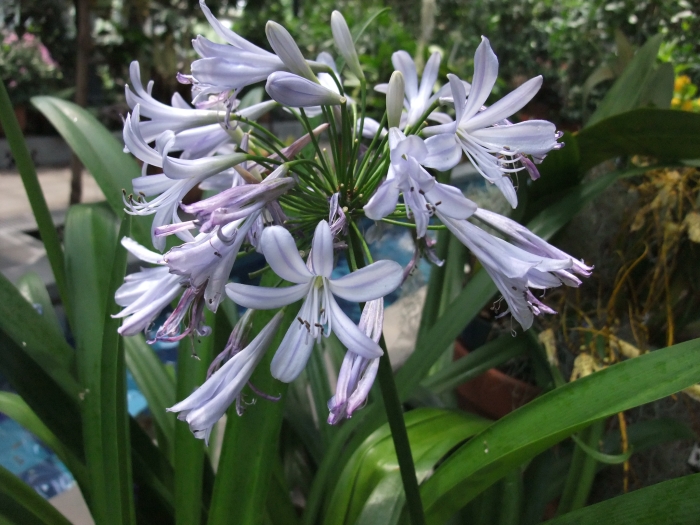African Lily
(Agapanthus orientalis)
African Lily (Agapanthus orientalis)
/
/

Chhe (talk)
Public domain
Image By:
Chhe (talk)
Recorded By:
Copyright:
Public domain
Copyright Notice:
Photo by: Chhe (talk) | License Type: Public domain | License URL: https://creativecommons.org/publicdomain/zero/1.0/ | Uploader: BotMultichillT | Publisher: Wikipedia Commons | Title: AgapanthusPraecoxOrientalis.jpg |

























Estimated Native Range
Summary
Agapanthus orientalis, commonly known as African Lily or Lily of the Nile, is an evergreen perennial herb native to the open, grassy plains and coastal areas of the Eastern Cape to KwaZulu-Natal in South Africa. It typically grows to a height of 0.8-3 feet (0.2-0.9 meters) and a width of up to 1 foot (0.3 meters). The plant forms clumps of strap-shaped leaves and bears tall stalks topped with globular clusters of funnel-shaped flowers, which come in shades of blue, purple, and white, blooming in the summer and early fall. The flowers are notably showy and make for striking ornamental displays.
African Lily is valued for its ease of maintenance and the vibrant color it adds to gardens. It is commonly used in borders, container planting, and as an accent plant in urban and coastal gardens. It thrives in full sun to partial shade and prefers well-drained soil. While it tolerates low water conditions, moderate watering promotes optimal blooming. Agapanthus can be susceptible to snails, slugs, and root rot if overwatered. It is also worth noting that all parts of the plant are toxic if ingested, so caution should be exercised around pets and children.CC BY-SA 4.0
African Lily is valued for its ease of maintenance and the vibrant color it adds to gardens. It is commonly used in borders, container planting, and as an accent plant in urban and coastal gardens. It thrives in full sun to partial shade and prefers well-drained soil. While it tolerates low water conditions, moderate watering promotes optimal blooming. Agapanthus can be susceptible to snails, slugs, and root rot if overwatered. It is also worth noting that all parts of the plant are toxic if ingested, so caution should be exercised around pets and children.CC BY-SA 4.0
Plant Description
- Plant Type: Herb
- Height: 1.5-4 feet
- Width: 2-3 feet
- Growth Rate: Moderate
- Flower Color: Blue, White
- Flowering Season: Summer
- Leaf Retention: Evergreen
Growth Requirements
- Sun: Full Sun, Part Shade
- Water: Medium
- Drainage: Medium
Common Uses
Bank Stabilization, Bee Garden, Bird Garden, Border Plant, Butterfly Garden, Deer Resistant, Drought Tolerant, Groundcover, Hummingbird Garden, Potted Plant, Rabbit Resistant, Rock Garden, Salt Tolerant, Showy Flowers, Street Planting
Natural Habitat
Open, grassy plains and coastal areas of the Eastern Cape to KwaZulu-Natal in South Africa
Other Names
Common Names:
Scientific Names: , Agapanthus orientalis, Agapanthus praecox subsp. orientalis, Agapanthus umbellatus var. maximus,
GBIF Accepted Name: Agapanthus praecox subsp. orientalis (F.M.Leight.) F.M.Leight.